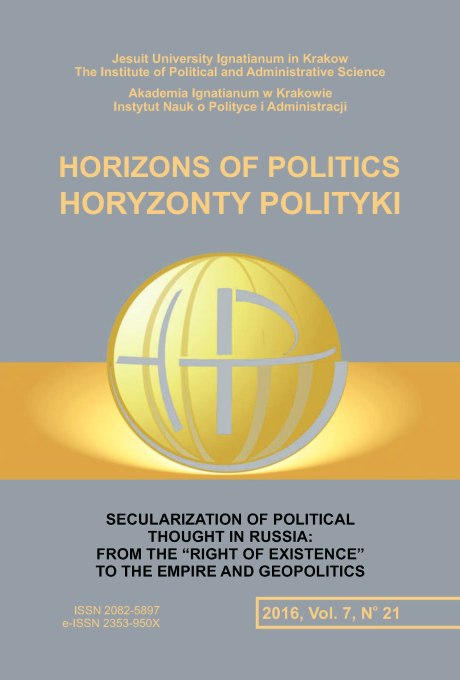The East-West Split in View of the History of Ideas
The East-West Split in View of the History of Ideas
Author(s): Jadwiga StaniszkisSubject(s): Politics / Political Sciences, Politics
Published by: Uniwersytet Ignatianum w Krakowie
Keywords: East;West;Russia;Reformation;History of ideas
Summary/Abstract: RESEARCH OBJECTIVE: Authoress looks for “paradigm of Russianness” – i.e. stable elements in the different phases of Russian history. She finds it on the meta-level as the constant, repetitive mechanism of selection and interpretation of borrowings from the West. It is joined with the mechanism of civilization East-West divide. Authoress opposes Western Nominalism to the construct that defines to as Byzantine Nominalism or ontology of hypostases (with the “proper existence” that must be “extracted”) and Gnosticism (i.e. the assumption that knowledge concerning of this ontology gives title to power). The Russian borrowings from the Reformation is an example of the operation of this mechanism of selection and interpretation. It allows to extract, from the doctrine of predestination, knowledge about the causal relationships in time (and full flexibility of this time), and from the Thomistic ontology – will as an element of the extracting of the “proper existence.”It has created a “genotype of revolutionariness” present in Russia until modern times. From this perspective, special relationships between Russia and Germany join with a diagnosis intellectual kinship of Russia with Germany – by the influence of Byzantine Nominalism on Germany (and of course via Mohylan Academy – on Russia) and easier for this reason acceptance in Russia borrowings from German. Until Marxism with his hypostasis being in itself and being for itself.THE RESEARCH PROBLEM AND METHODS: The presented research problem concerns the specifics of Russia in the context of the history of ideas, with sources of this specificity – found in early Christianity and in the split to the East and the West. There have been applied the methods of sociological analysis of history, anthropology of power, and comparative analysis.THE PROCESS OF ARGUMENTATION: After having initially defined the aim of the study, the fundamental concepts and terms. Then they were taken preliminary considerations on the paradigm of Russianness (genesis) and developing of this category (deconstruction). This issue was presented in the form of the historical process. A further part of the study describes the phenomenon of the Russian revolutionary mentality. At the end of research deliberations have been presented the problem of secularization and the differences in this process between the West and Russia.RESEARCH RESULTS: The result of the study is to clarify the influence of ancient and medieval Christian ideas on the development “paradigm of Russianness” and Russian “genotype of revolutionariness” in the context of the division of Europe into the East and West. With the “distorting mirror” between East and West rather than the Russian “specificity.”CONCLUSSIONS, INNOVATIONS AND RECOMMENDATIONS: The setting a European frame of reference (mainly Reformation and Counter‑Reformation as well as lack in Russia of Augustinian concept of subject and Roman vision of the authonomy of form) as the main “axis” of Russian history is a perspective field of research (research proposal). This field allows to avoid simplifying stereotypical interpretations – focusing on describing the civilizational dissimilarity of Russia, as a separated world, and external signs of Russian imperialism, as a major carriers of sense of the Russian history and its interpretation.
Journal: Horyzonty Polityki
- Issue Year: 7/2016
- Issue No: 21
- Page Range: 9-54
- Page Count: 46
- Language: English

